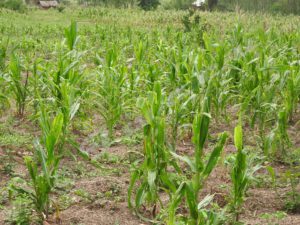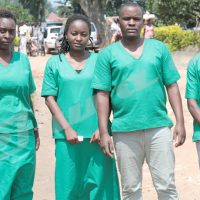The fields are dry due to drought caused by the shortage of rain in Bubanza western province of Burundi. Four people have already died since the past two weeks. Serious measures will be taken if the situation persists, government say.

Drought, the main cause of hunger in Bubanza Province
“I have nothing to eat. I have only legumes that I ate for several days. I can die at any time”, says a resident met in Muyange site of Rugungu hill in the commune of Gihanga, Bubanza Province. She says she happens to spend three days without eating. “We did not harvest anything due to drought that negatively affected our agricultural products”, she says.
Four people died in two weeks only from Muyange site in Gihanga Commune following the shortage of food in the locality. Augustin Ntirandekura, chief of Muyange site, says many people experience hunger these days. “We have tried to assist them by giving food but it was too late. They were really starving given that no disease was detected from them at the hospital”, he says.
Ntirandekura says there are other people who are still suffering from hunger. “If nothing is done, other people will die. There are other three people who are starving to death. They are really in need of humanitarian assistance”, he says. Out of 500 people suffering from starvation, only 75 have already received food assistance.
Serious measures are to be taken to alleviate hunger
Tharcisse Niyongabo, Governor of Bubanza Province says those people died due to other diseases related to malnutrition and adds that there are others who are suffering from hunger.
“On the basis of daily reports from different area chiefs, about 3000 families are suffering from hunger in Bubanza Province”, he says. Bubanza Province Governor called on everyone to intervene and assist the starving population.
Térence Ntahiraja, Assistant to and Spokesperson for the Interior Ministry, says it is not only in Bubanza Province where people are suffering from hunger. He says Rugombo and Buganda communes of Cibitoke Province and a part of Bubanza Province are the most affected by hunger. “Due to the shortage of food, people must carefully conserve their agricultural products”, he says.
Ntahiraja says some measures to import goods would be taken if it is necessary. “Measures to import food would be taken depending upon the situation in the country as it has been done for sugar”, he says.
About 90% of Burundians live thanks to agricultural products and about 35% do not have where to cultivate, says Faustin Ndikumana, Chairman of Parcem, a local NGO that aims at changing Burundians’ mentality.
The Ministry of Foreign Affairs in collaboration with the resident coordinator of the UN agencies will officially launch this 19 January a « Burundi Humanitarian Response Plan in 2017”.
The plan will focus on risk areas, categories of people affected and the number of people that are really in need of humanitarian assistance.


















 IWACU Open Data
IWACU Open Data

